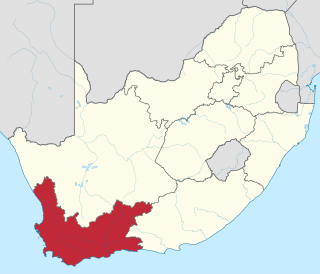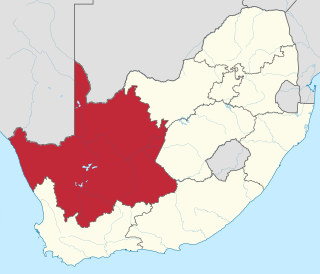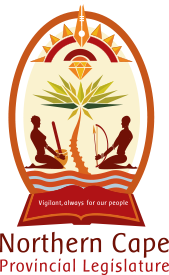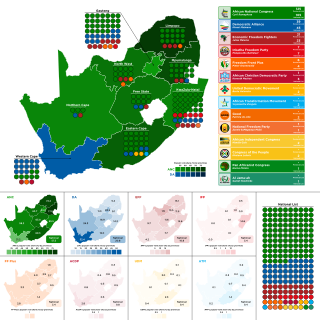
The Western Cape is a province of South Africa, situated on the south-western coast of the country. It is the fourth largest of the nine provinces with an area of 129,449 square kilometres (49,981 sq mi), and the third most populous, with an estimated 7 million inhabitants in 2020. About two-thirds of these inhabitants live in the metropolitan area of Cape Town, which is also the provincial capital. The Western Cape was created in 1994 from part of the former Cape Province. The two largest cities are Cape Town and George.

The Parliament of the Republic of South Africa is South Africa's legislature; under the present Constitution of South Africa, the bicameral Parliament comprises a National Assembly and a National Council of Provinces. The current twenty-seventh Parliament was first convened on 22 May 2019.

The Northern Cape is the largest and most sparsely populated province of South Africa. It was created in 1994 when the Cape Province was split up. Its capital is Kimberley. It includes the Kalahari Gemsbok National Park, part of the Kgalagadi Transfrontier Park and an international park shared with Botswana. It also includes the Augrabies Falls and the diamond mining regions in Kimberley and Alexander Bay.

The Freedom Front Plus is a right-wing political party in South Africa that was formed in 1994. It is led by Pieter Groenewald. Its current stated policy positions include abolishing affirmative action, replacing it with merit based appointments, and being firmly against the proposed expropriation without compensation land reform movement to protect the rights and interests of minorities, especially Afrikaners and Afrikaans speaking Coloureds. The party also supports greater self-determination for minorities throughout South Africa, and expressly has adopted Cape Independence as an official party position.

The National Assembly is the directly elected house of the Parliament of South Africa, located in Cape Town, Western Cape. It consists of four hundred members who are elected every five years using a party-list proportional representation system where half of the members are elected proportionally from nine provincial lists and the remaining half from national lists so as to restore proportionality.

General elections were held in South Africa on 7 May 2014, to elect a new National Assembly and new provincial legislatures in each province. It was the fifth election held in South Africa under conditions of universal adult suffrage since the end of the apartheid era in 1994, and also the first held since the death of Nelson Mandela. It was also the first time that South African expatriates were allowed to vote in a South African national election.
Like South Africa's eight other provinces, the Northern Cape is governed by a parliamentary system, in which the Premier of the Northern Cape is elected by the Northern Cape Provincial Legislature and in turn selects the Northern Cape Executive Council. As in most other provinces, the African National Congress (ANC) has led the Northern Cape Provincial Government since the end of apartheid. In the most recent provincial election, held in 2019, the ANC won 18 of 30 seats in the provincial legislature and the Democratic Alliance was the official opposition in the legislature. Pursuant to the same election, Zamani Saul was elected Premier of the province.

The Northern Cape Provincial Legislature is the legislature of the Northern Cape province of South Africa. It is a unicameral body of 30 members elected every five years. The current legislature was elected on 8 May 2019 and has an African National Congress majority of 18 members. It is situated in Kimberley, in a newly built complex to the west of the city centre on the edge of Galeshewe.

General elections were held in South Africa on 8 May 2019 to elect a new President, National Assembly and provincial legislatures in each province. These were the sixth elections held since the end of apartheid in 1994 and determined who would become the next President of South Africa.

A provincial election was held in the Western Cape on 7 May 2014 to elect a new provincial parliament. It was the fifth provincial election held since the end of the apartheid era, and also the first held since the death of Nelson Mandela. Although not constitutionally required, the election was held simultaneously with elections to the National Assembly. The legislature is unicameral, and consists of 42 members elected by a system of party-list proportional representation.

The 2019 Western Cape provincial election was held on 8 May 2019 to elect the 6th Western Cape Provincial Parliament. It was the sixth provincial election held since the establishment of the provincial legislature in 1994.

The Electoral Commission of South Africa (IEC) announced on 20 March 2019 that a record number of 48 parties had registered candidates for the national parliamentary election. This is 19 more parties that contested the 2014 national elections. In the provincial legislature elections, the total number of parties registering candidates were:

Melikhaya Xego is a South African politician. A member of the Economic Freedom Fighters (EFF), he served as a Member of the Western Cape Provincial Parliament from 22 May 2019 until 28 January 2023. He is the former Provincial Chairperson of the party.

The 2019 Gauteng provincial election was held on 8 May 2019, concurrently with the 2019 South African general election, to elect the 73 members of the Gauteng Provincial Legislature.
Mmabatho Olive Mokause is a South African politician serving as a permanent delegate to the National Council of Provinces from the Northern Cape since March 2020. She is a member of the Economic Freedom Fighters (EFF). Mokause was a Member of the Northern Cape Provincial Legislature from May 2014 to April 2015. She was appointed to the National Assembly of South Africa, the lower house of Parliament, in April 2015 and served in the chamber until January 2018. After the May 2019 general election, she returned to the National Assembly, but resigned in September. In March 2020, she was selected to represent the EFF in the upper house.

Limpopo is one of the nine multi-member constituencies of the National Assembly of South Africa, the lower house of the Parliament of South Africa, the national legislature of South Africa. The constituency was established as Northern Transvaal in 1994 when the National Assembly was established by the Interim Constitution following the end of Apartheid. It was renamed Northern in 1999 and Limpopo in 2004. It is conterminous with the province of Limpopo. The constituency currently elects 19 of the 400 members of the National Assembly using the closed party-list proportional representation electoral system. At the 2019 general election it had 2,608,460 registered electors.

Northern Cape is one of the nine multi-member constituencies of the National Assembly of South Africa, the lower house of the Parliament of South Africa, the national legislature of South Africa. The constituency was established in 1994 when the National Assembly was established by the Interim Constitution following the end of Apartheid. It is conterminous with the province of Northern Cape. The constituency currently elects five of the 400 members of the National Assembly using the closed party-list proportional representation electoral system. At the 2019 general election it had 626,471 registered electors.
The 2019 Northern Cape provincial election was held on 8 May 2019 to allocate the 30 seats of the Northern Cape Provincial Legislature. Like all the South African provincial elections, it was held on the same day as the South African general election. 21 political parties participated in the election, of which only the African National Congress, Democratic Alliance, Economic Freedom Fighters, and Freedom Front Plus won seats. The ANC lost two seats, but maintained a majority.

















